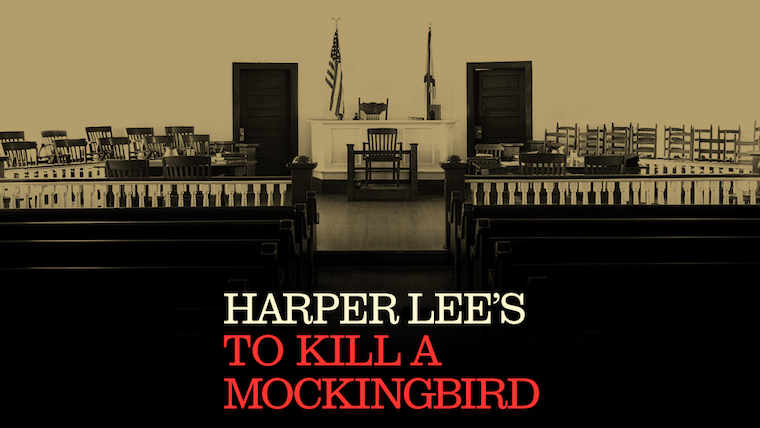How do you faithfully transfer a classic and much-beloved novel to the stage and convey the precise charm and power of the original? You don’t. It simply isn’t possible, especially with the writing and weighty school-taught history of Harper Lee’s practically-perfect work. Rather than attempt a straight-forward translation, Aaron Sorkin wisely reinterprets, to a minor extent, the story of ‘To Kill A Mockingbird,’ bringing it into the modern-day lexicon and leaning on the powerful parallels with today’s volatile social climate. Yet far from removing the grace and tenderness of the original, it translates its overriding themes into our cynical and, some might rightly say, evil times while keeping the story very much of its own era. It’s both telling and tragic to see how some things haven’t changed very much.
A noble yet deceptively-subtle star-turn by Jeff Daniels as Atticus Finch provides the bedrock foundation around which his children and the story at hand tread delicate, damning steps. When that foundation reveals cracks and fissures, and the steadfast archetype of Atticus gets shaken more than he did in the original book, it reveals the shifting tectonics of all the time that has gone by since its first publication, as well as a more complex reading of a character we all thought we knew so well. The doubly-nuanced layers of this lend the production its pristine sparkle and compelling relevance.
Daniels gets the star status here, but rather than going the easy route with showy theatrics or affably robust stalwartness, he underplays with almost infuriatingly-restrained nuances, occasionally mumbling what I’m hoping were throwaway lines (since I missed a few of them). It’s a genius move on his part, turning much of the audience into the children he so easily vexes with his unflappable and imperturbable conscience ~ like his daughter Scout.
Inhabiting a child’s body that manages to exhibit energy, awkwardness, and grace all at once, Celia Keenan-Bolger is the earnest heart of the piece, one that has to break a little to grow. As she comes of age during the summer at hand, she loses a bit of her innocence, not unlike the country depicted at the time. We all lose a little bit of innocence when faced with ugly realities.
In the world then, as in the world now, violence is ever-ready to descend, even in the unlikeliest of places. The heaviness of it all is not always blatant, but it’s somehow more vicious because of its hidden nature. Seen and sensed in a demolished camellia, a rumpled ham costume, and a broken arm, it seeps into everything, and when it finally explodes with visceral ferocity (as in the moment when Atticus spars with Bob Ewell) the audience finds itself in conflicted, exultant relief. Yet even in the most chilling and tense portion of both the play and the book, as a gang of hooded townsfolk come to deliver their own violent justice to the accused, the idea of violence ~ and the possibility of its eruption ~ is more menacing than any actual act itself. Like the book, this Mockingbird sings of tension and strife that thrives just beneath the surface, constantly threatening to bubble up at any moment. Atticus seems built to steer clear of such churnings, but when it finally reaches his own children, he has his own quiet reckoning.
As Scout, Keenan-Bolger is an admirable foil for Daniels ~ all exuberance and hope and reverence for her father. In his portrayal of Scout’s brother Jem ~ Will Pullen channels fervent, righteous impatience that sometimes boils over into anger. He wants to please his father as much as he questions his steadfast beliefs and methods of doling out justice. Rounding out the kids is a visiting quirky neighbor, Dil, who is impressively fleshed out by Gideon Glick, even given the character’s backseat status.
Much has been made of Calpurnia’s more pointed deviation from her role in the book, and though LaTanya Richardson Jackson ends up heavy-handed in some spots, overall she is the update that this ‘Mockingbird’ needs to make it soar, and such tweaking doesn’t spoil or destroy the intent. Who knows, maybe a privileged audience in today’s world needs such a reckoning?
The play begs for modern-day comparisons, a tribute both to its source material and Sorkin’s masterful update. Is Atticus the precursor or prototype of someone like Robert Mueller? Steadfastly holding true to the methods and laws and beliefs of a system that proves broken in the face of moral complexities and less-than-moral personalities? I’ll leave that for you to decide. This version of Mockingbird is ripe for many readings, and based on ticket sales and audience response (a rabid round of applause was heard whenever someone pushed against prejudice or patriarchy) this version may be the antidote to our troubled times.
The spell of the stage adaptation lies in large part to a stellar cast. It lures you in with its seductive southern drawl, it unarms with a little wit and laughter, and then it pounces with deadly accuracy, aiming right for the heart. It tears down what small bit of hope we might still have in humanity, while building it back up with the smallest of gestures. It’s there in the unsaid and unspeakable support Atticus delivers with a kiss to Dil’s head. The supposed innocence of a child recognizing the voice of a classmate’s father behind a hood of hate. The conflicted and ultimately resigned acceptance of what we can’t change, and the indefatigable audacity of what we might change simply by trying.
In the end, when Atticus is forced to bend his rigid by-the-book beliefs, it is heartbreaking yet affirming. We have to sit with our decisions for the rest of our lives. In the same way we sit beside our past, and sometimes it’s uncomfortable, and sometimes it’s wrong, and when there are no right answers, you do the best with the lessons you’ve been given, the life only you have known, and once in a while you can move your own moral compass, shifting it just the slightest bit, and that has to be enough.
Back to Blog

